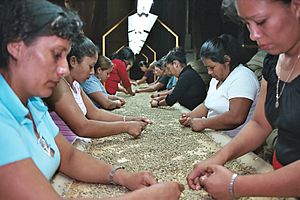Coffee production in El Salvador facts for kids

Coffee production in El Salvador has been a huge part of the country's story and its economy for over 100 years. Coffee farming grew very quickly in the 1800s. For a long time, coffee sales brought in more than half of all the money El Salvador earned from exports. In 1980, this reached its highest point, bringing in over $615 million!
However, El Salvador faced some difficult times in the 1980s. This made it hard for the coffee industry to fully recover. By 1985, earnings from coffee dropped to about $403 million. Other countries started growing coffee too, which made prices go down. By 2002, coffee trading was only a small part of El Salvador's total economy.
Most of El Salvador's coffee, over 90%, is grown in the shade of other trees. About 80% of the country's forests are connected to these shade coffee farms.
How Coffee Became Important
People in El Salvador first started growing coffee for their own use in the early 1800s. By the middle of that century, it was clear that coffee could be a very valuable crop to sell. The government began to help coffee farmers. They offered things like tax breaks and even let coffee workers avoid military service. They also removed taxes on coffee exports for new farmers. By 1880, coffee had become almost the only crop El Salvador sold to other countries.
Before coffee, a plant called Indigofera was the main export. This plant was used to make blue dye. Coffee was a bit harder to grow than indigo. Coffee bushes take several years to produce beans that can be harvested. This meant farmers needed more money, workers, and land to start a coffee farm. Coffee also grows best at certain heights, while indigo could grow almost anywhere.
Unlike some other countries like Guatemala and Costa Rica, El Salvador's coffee industry grew mostly on its own. It didn't get much outside help with farming methods or money. Even so, El Salvador became one of the best coffee producers in the world! This was especially true on the very large coffee farms. The bigger the farm, the more coffee they could grow per area of land. This is quite unusual for large farms.
Growing coffee changed El Salvador a lot. It affected how land was owned and used. The coffee industry also helped build important things like roads and railroads. It also helped connect local communities into the country's main economy.
 | Emma Amos |
 | Edward Mitchell Bannister |
 | Larry D. Alexander |
 | Ernie Barnes |


